
Pender County is a county located in the U.S. state of North Carolina. As of the 2020 census, the population was 60,203. Its county seat is Burgaw. Pender County is part of the Wilmington, NC Metropolitan Statistical Area.

Duplin County is a county located in the U.S. state of North Carolina. As of the 2020 census, the population was 48,715. Its county seat is Kenansville.

Scouting in North Carolina has a long history, from the 1910s to the present day, serving thousands of youth in programs that suit the environment in which they live.
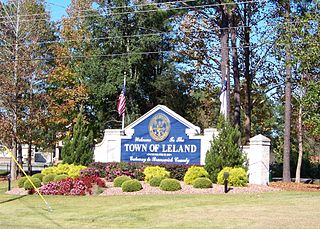
Leland is the most populous town in Brunswick County, North Carolina, United States. The population was 23,504 at the 2020 census, up from 13,527 in 2010. As of 2020, it is considered to be one of the fastest growing towns in North Carolina. It is part of the Wilmington, NC Metropolitan Statistical Area. and the Cape Fear Council of Governments. The town of Leland is in the northeastern part of Brunswick County, with the town of Navassa to the north, Belville to east, and Boiling Spring Lakes to the south. It is part of the Town Creek township, and Cape Fear region of North Carolina, a short distance north of the South Carolina state line. Leland is located five miles (8.0 km) west of Wilmington, 71 miles (114 km) north of Myrtle Beach, 84 miles (135 km) southeast of Fayetteville, and 135 miles (217 km) southeast of Raleigh.
Beulaville is a town located in Duplin County, North Carolina, United States. As of the 2020 census, the population was 1,116. At the previous census in 2010, the population was 1,296. The community lies within the Limestone Creek Township.

Kenansville is a town in Duplin County, North Carolina, United States. Its population was 770 at the 2020 census. It is the county seat of Duplin County. The town was named for James Kenan, a member of the North Carolina Senate. Liberty Hall, his early 1800s era historic home, is located within Kenansville.

Wentworth is a town in Rockingham County, North Carolina, United States. The population was 2,646 at the 2020 census. Wentworth is the county seat of Rockingham County and is part of the Greensboro-High Point metropolitan area of the Piedmont Triad. On May 6, 2022, an EF-1 Tornado hit Wentworth. The storm traveled as a supercell with crazy structure from the Pilot Mountain, North Carolina, and Pinnacle, North Carolina, area across central Stokes County and into Rockingham County. It took out trees, damaged homes, and blocked roads before it lifted off southwest of Reidsville.

The North Carolina General Assembly of 1777 met in two sessions in New Bern, North Carolina, from April 7 to May 9, 1777, and from November 15 to December 24, 1777. This was the first North Carolina legislature elected after the last provincial congress wrote the first North Carolina Constitution. This assembly elected Richard Caswell as the state's first constitutional governor.
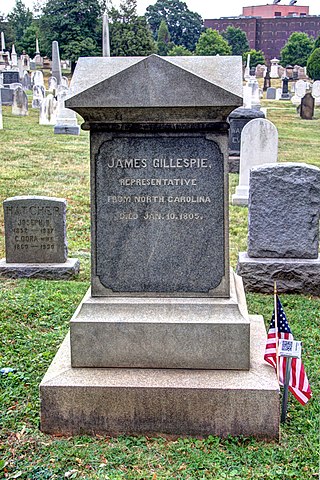
James Gillespie was an American Revolutionary War veteran and politician from North Carolina. He was first elected to the U.S. House of Representatives in 1793 and died in office on January 10, 1805. Prior to serving in the U.S. Congress, Gillespie was a member of the North Carolina House of Commons, the North Carolina Senate, and held various positions in the state government. An ardent Anti-Federalist, he voted twice against the ratification of the U.S. Constitution.
Chinquapin is an unincorporated community and census-designated place (CDP) located adjacent to the Northeast Cape Fear River in Duplin County, North Carolina, United States. It was first listed as a CDP in the 2020 census with a population of 86.

North Carolina Highway 11 is a primary state highway in the U.S. state of North Carolina. Traveling 193.2 miles (310.9 km) in a north–south alignment through Eastern North Carolina, it connects the towns and cities of Wallace, Kenansville, Kinston, Greenville and Murfreesboro.
Duplin County Airport is a county-owned, public-use airport in Duplin County, North Carolina, United States. It is located two nautical miles (4 km) northwest of the central business district of Kenansville, North Carolina. This airport is included in the National Plan of Integrated Airport Systems for 2011–2015, which categorized it as a general aviation facility.
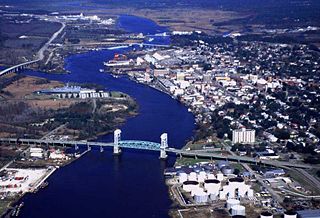
Cape Fear is a coastal plain and Tidewater region of North Carolina centered about the city of Wilmington. The region takes its name from the adjacent Cape Fear headland, as does the Cape Fear River which flows through the region and empties into the Atlantic Ocean near the cape. Much of the region's populated areas are found along the Atlantic beaches and the Atlantic Intracoastal Waterway, while the rural areas are dominated by farms and swampland like that of the Green Swamp. The general area can be also identified by the titles "Lower Cape Fear", "Wilmington, NC Metropolitan Statistical Area", "Southeastern North Carolina", and "Azalea Coast". The latter name is derived from the North Carolina Azalea Festival held annually in Wilmington. Municipalities in the area belong to the Cape Fear Council of Governments.
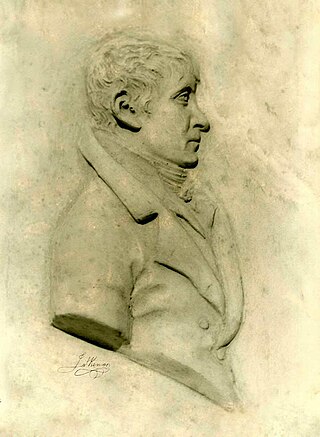
James Kenan was a member of the North Carolina Senate, serving from 1777 to 1793. A senior officer of militia; he also commanded a North Carolina regiment, and temporarily a militia district (brigade), in the Southern Theater of the American Revolutionary War.
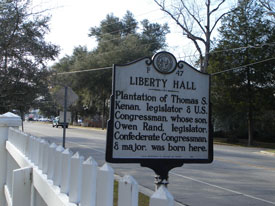
Thomas Stephen Kenan was the son of Revolutionary War General James Kenan, a plantation owner and builder of the first "Liberty Hall". He was a U.S. Congressman from North Carolina between 1805 and 1811.
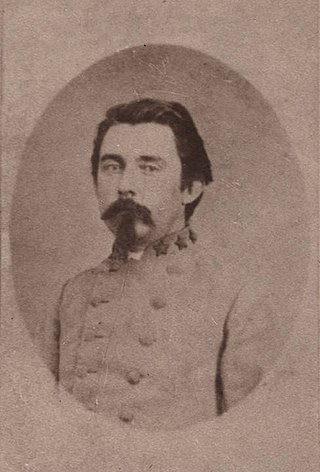
Thomas Stephen Kenan was an American lawyer, Confederate soldier and politician. He served as the Attorney General of North Carolina in 1877–1885.
Duplin County Schools is a PK–12 graded school district serving Duplin County, North Carolina. Its 16 schools serve 9,145 students as of the 2010–11 school year.
Richard Clinton (1720–1795) was an officer in the Continental Army during the American Revolution, a member of the North Carolina General Assembly, a Register of Deeds for Duplin County and a prominent citizen of Sampson County.

Hallsville is an unincorporated community located adjacent to the Northeast Cape Fear River in Duplin County, North Carolina, United States.

The Triangle Torch was a professional indoor football team playing in North Carolina. The team first played as the Triangle Torch in Raleigh, North Carolina, and was named after the larger Research Triangle region. The Torch started in 2016 as an expansion franchise of American Indoor Football (AIF). The AIF ceased operations and the Torch joined Supreme Indoor Football for the 2017 season. For the 2018 season, the team relocated to Kenansville, North Carolina, as the East Carolina Torch, and joined the American Arena League for its inaugural season.
















